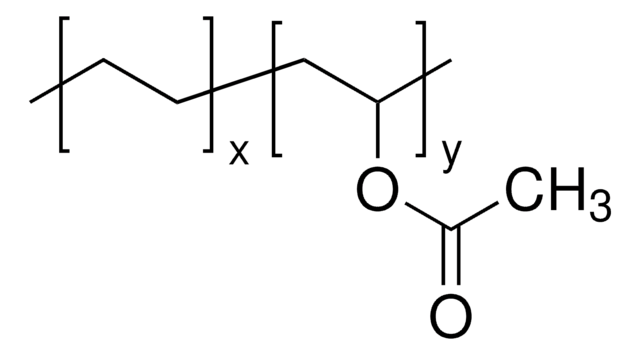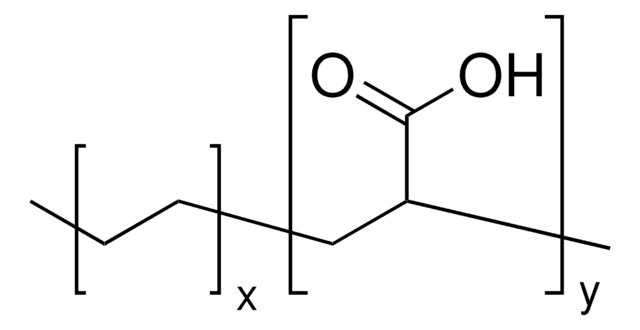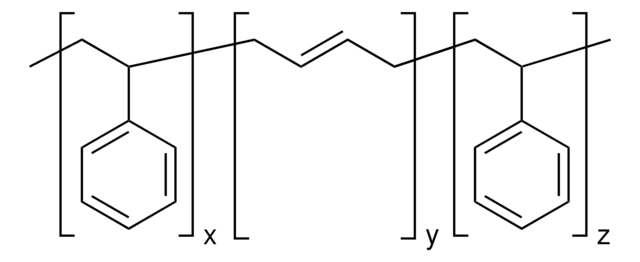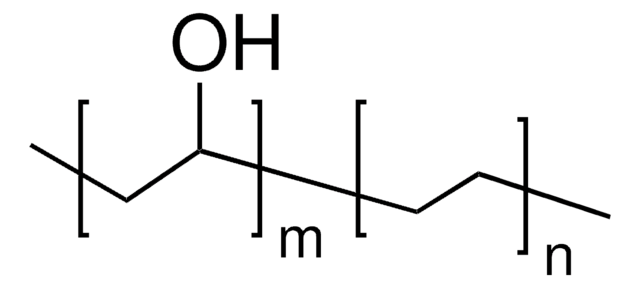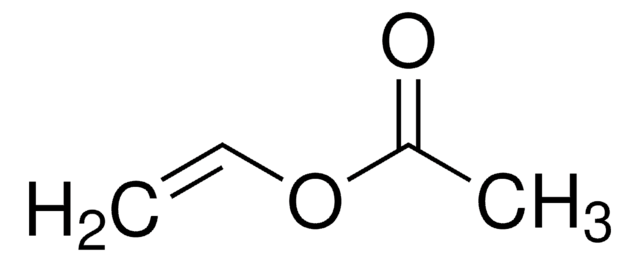437239
Poly(ethylene-co-vinyl acetate)
vinyl acetate 18 wt. %, melt index 8 g/10 min (190°C/2.16kg), contains 200-900 ppm BHT as inhibitor
Sign Into View Organizational & Contract Pricing
All Photos(2)
About This Item
Linear Formula:
(CH2CH2)m[CH2CH(OCOCH3)]n
CAS Number:
MDL number:
UNSPSC Code:
12162002
PubChem Substance ID:
NACRES:
NA.23
Recommended Products
form
beads
Quality Level
autoignition temp.
500 °F
melt index
8 g/10 min (190°C/2.16kg)
contains
200-900 ppm BHT as inhibitor
composition
vinyl acetate, 18 wt. %
hardness
38 (Shore D, ASTM D 2240)
mp
87 °C
transition temp
softening point 61 °C (Vicat, ASTM D 1525)
density
0.94 g/mL at 25 °C
SMILES string
C=C.CC(=O)OC=C
InChI
1S/C4H6O2.C2H4/c1-2-3-4(5)6;1-2/h2H,1,3H2,(H,5,6);1-2H2
InChI key
DQXBYHZEEUGOBF-UHFFFAOYSA-N
Looking for similar products? Visit Product Comparison Guide
Application
Flexible tubing, color concentrates, gaskets and molded parts for autos, plastic lenses and pumps.
Features and Benefits
Thermoplastic, resilient, tough and resistant to ozone and environmental stress cracking. Inherently flexible, requiring no plasticizers.
signalword
Warning
hcodes
Hazard Classifications
Carc. 2
Storage Class
11 - Combustible Solids
wgk_germany
WGK 2
flash_point_f
Not applicable
flash_point_c
Not applicable
Choose from one of the most recent versions:
Already Own This Product?
Find documentation for the products that you have recently purchased in the Document Library.
Customers Also Viewed
Roberto Scaffaro et al.
Journal of food protection, 74(7), 1137-1143 (2011-07-12)
Both industry and academia have shown a growing interest in materials with antimicrobial properties suitable for food packaging applications. In this study, we prepared and characterized thin films of ethylene-co-vinyl acetate (EVA) copolymer with antimicrobial properties. The films were prepared
Christopher Mc Conville et al.
Journal of biomedical materials research. Part B, Applied biomaterials, 100(4), 891-895 (2012-03-23)
Vaginal rings are currently being investigated for delivery of HIV microbicides. However, vaginal rings are currently manufactured form hydrophobic polymers such as silicone elastomer and polyethylene vinyl acetate (PEVA), which do not permit release of hydrophilic microbicides such as the
Kevin B Biggs et al.
Langmuir : the ACS journal of surfaces and colloids, 28(21), 8238-8243 (2012-04-27)
Drug release from and coating morphology on a CYPHER sirolimus-eluting coronary stent (SES) during in vitro elution were studied by correlated confocal Raman and atomic force microscopy (CRM and AFM, respectively). Chemical surface and subsurface maps of the SES were
A Almeida et al.
International journal of pharmaceutics, 439(1-2), 223-229 (2012-09-29)
The aim of the present work was to evaluate drug release and quality of EVA/drug matrices at different PEO 7M concentrations (5 and 15%), manufactured using two different hot-melt extruders: a lab-scale mini extruder and a pilot-scale extruder. The process
Wei Li Lee et al.
Journal of biomedical materials research. Part A, 100(12), 3353-3362 (2012-06-27)
Numerous models that predict drug release from nonerodible reservoir-membrane sphere systems have been presented. Most of these models cater only to a phase of drug release from a constant reservoir. All these models, however, are not applicable to drug release
Our team of scientists has experience in all areas of research including Life Science, Material Science, Chemical Synthesis, Chromatography, Analytical and many others.
Contact Technical Service